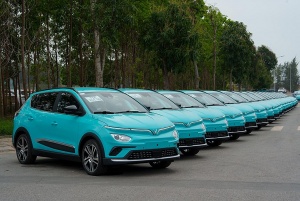Vietnam's ride-hailing market to reach $880,000 in 2024
 |
Wih Vietnam’s rapidly growing urban population, the lack of public transportation options, and increasing traffic congestion, the demand for private modes of transportation has gone up in recent years. Consumers’ increasing preference for private transportation arises mainly from convenience, and the growing number of tourists in Vietnam serve as major determinants for the growth of the ride-hailing market in Vietnam.
Additionally, the rise in travel and tourism and the emergence of a young and tech-savvy population have further fuelled the adoption of ride-hailing services. Platforms like Xanh SM, Grab, and Gojek are emerging as dominant players in the digital side of Vietnam’s ride-hailing market.
Passenger cars will continue to be the largest segment because they offer a comfortable and personalised mode of transportation, catering to the preferences of Vietnamese consumers. The growing urban population and increasing disposable incomes have led to a rise in demand for convenient transportation options, particularly among urban commuters and young professionals.
In 2023, Vietnam’s internet coverage reached nearly 80 per cent. Internet usage in Vietnam is predominantly mobile-based, with a high smartphone penetration rate. The increasing penetration of smartphones and mobile apps aids consumers in accessing ride-hailing services and booking passenger cars on-the-go.
Modor Intelligence reports that Ho Chi Minh City was the largest market for ride-hailing in Vietnam. Over the past decade, app-based driving services like ride-hailing and deliveries have become integral to business, employment, and daily life in Ho Chi Minh City. The city has the largest population in Vietnam, which offers a significant consumer base for ride-hailing companies.
The Vietnamese government is encouraging the adoption of electric vehicles, which is a pivotal measure to combat transport challenges. The government also aims to reduce greenhouse gas emissions, alleviate traffic congestion, and improve overall urban living conditions. These efforts mitigate the effects of climate change and create a conducive environment for expanding ride-hailing services in the city.
Overall, the Vietnamese ride-hailing market is moderately consolidated, with players like Grab Holdings Inc., Xanh SM (GSM JSC), Be Group JSC, Go-Viet, and FastGo in Vietnam. The greatest threat to Grab Holdings Inc. in the future may come from Xanh SM, Vietnam's first-ever pure electric taxi company.
Xanh SM has been aggressively expanding its market foothold due to its strong partnership growth. The company has partnered with several taxi firms across Vietnam, including Lado Taxi, Son Nam, Thanh Ha Transport, ASV Airport Taxi, En Vang, and Taxi Xanh Sapa.
Several players in the market are engaged in mergers, strategic partnerships, and new product and service launches to stay ahead of the competition. In July 2023, Grab Holdings declared its intention to acquire the entire shareholding of Trans-cab Holdings. This acquisition, encompassing Trans-cab's taxi and car rental operations, maintenance workshop, and fuel pump activities, was executed through Grab's subsidiary.
 | Vingroup's GSM to launch ride-hailing and electric motorcycle services Green and Smart Mobility Corporation (GSM) has announced plans to extend its electric taxi services to 27 cities and provinces in Vietnam, as part of the company's commitment to green mobility and sustainable transportation. |
 | Grab proposes simplified administrative procedures for ridesharing Grab proposes Vietnam to remove administrative procedures that are hindering the sharing economy, as well as promote the development of electric vehicles. |
 | Ride-hailing app Be bags first prize at Vietnamese Talent Awards Vietnamese ride-hailing app Be has scooped up the first prize in the IT category at this year's Vietnamese Talent Awards. |
What the stars mean:
★ Poor ★ ★ Promising ★★★ Good ★★★★ Very good ★★★★★ Exceptional
Related Contents
Latest News
More News
- Vietnam-South Africa strategic partnership boosts business links (February 06, 2026 | 13:28)
- Mondelez Kinh Do renews the spirit of togetherness (February 06, 2026 | 09:35)
- Seafood exports rise in January (February 05, 2026 | 17:31)
- Accelerating digitalisation of air traffic services in Vietnam (February 05, 2026 | 17:30)
- Ekko raises $4.2 million to improve employee retention and financial wellbeing (February 05, 2026 | 17:28)
- Dassault Systèmes and Nvidia to build platform powering virtual twins (February 04, 2026 | 08:00)
- The PAN Group acquires $56 million in after-tax profit in 2025 (February 03, 2026 | 13:06)
- Young entrepreneurs community to accelerate admin reform (February 03, 2026 | 13:04)
- Spring Fair 2026 launches national fair series (January 30, 2026 | 16:17)
- SnP celebrates 10th anniversary with new brand identity (January 30, 2026 | 14:41)

 Tag:
Tag:



















 Mobile Version
Mobile Version